On March 10th the BBC News website published a report produced by BBC Verify and BBC Arabic under the headline “IDF completes road across width of Gaza, satellite images show”.
Credited to no fewer than seven members of BBC staff (Abdirahim Saeed of BBC Arabic, Tom Spencer, Paul Brown and Richard Irvine-Brown as well as Paul Cusiac, Alex Murray and Erwan Rivault), that report relates to a story which has been doing the rounds since February.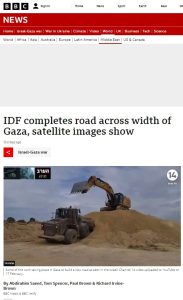
The BBC’s account opens as follows:
“The Israel Defense Forces (IDF) has finished building a new road which runs across northern Gaza from east to west, according to satellite images verified by the BBC.
The IDF told the BBC they were attempting to gain an “operational foothold”, and facilitate the movement of troops and equipment.
But some experts fear it will used as a barrier, preventing Palestinians from returning to their homes in the north.
Others said it appeared to be part of an Israeli plan to remain in Gaza beyond the end of current hostilities.” [emphasis added]
While the IDF did indeed state in February that the objective of the unpaved road is “to move logistics and soldiers” (in an area in which roads may well be booby trapped with roadside explosive devices), the aim of this BBC report is to insinuate a different agenda, described by the BBC as follows:
“In February, Prime Minister Benjamin Netanyahu unveiled a post-war vision in which Israel would control security in Gaza indefinitely.
International leaders have previously warned Israel against permanently displacing Palestinians or reducing the size of Gaza.”
The BBC’s report cites five “experts”.
“Analysts at Janes, a defence intelligence company, said the type of unpaved road surface seen in the Channel 14 footage, was suitable for tracked armoured vehicles.”
Next up are two Israeli commentators with military experience.
“Retired Brig Gen Jacob Nagel, former head of Israel’s National Security Council and a former security adviser to Mr Netanyahu, told BBC Arabic that the objective of the new route was to provide fast access for security forces when dealing with fresh threats.
“It will help Israel go in and out… because Israel is going to have total defence, security and responsibility for Gaza,” he told BBC Arabic.
He described it as “a road that divides the northern part from the southern part”.
“We don’t want to wait until a threat is emerging,” he added.
Maj Gen Yaakov Amidror, formerly of the IDF, had a similar view. The primary purpose of the new road was to “facilitate logistical and military control in the region”, he said.”
After that, the speculations begin:
“Justin Crump, a former British Army officer who runs Sibylline, a risk intelligence company, said the new route was significant.
“It certainly looks like it’s part of a longer-term strategy to have at least some form of security intervention and control in the Gaza Strip,” said Mr Crump.
“This area cuts off Gaza City from the south of the strip, making it an effective control line to monitor or limit movement, and has relatively open fields of fire.””
One of course seriously doubts that Mr Crump and his company are privy to any “longer-term strategy” which may have been devised by Israel’s government and security forces.
Finally, readers find the ‘expert analysis’ that is actually the point of this article.
“Khaled Elgindy, a senior fellow at the US-based Middle East Institute, also thinks the road is a long-term project.
“It appears that the Israeli military will remain in Gaza indefinitely,” he told the BBC.
“By dividing Gaza in half, Israel will control not only what goes in and out of Gaza, but also movement within Gaza,” said the analyst.
“This includes quite possibly preventing the 1.5 million displaced Palestinians in the south from returning to their homes in the north.””
Despite the BBC editorial guidelines on the topic of ‘contributors’ affiliations’, readers are not told that Elgindy “served as an adviser to the Palestinian leadership in Ramallah on permanent status negotiations with Israel from 2004 to 2009” or that the think tank which employs him enjoys funding from Qatar – the state which hosts, finances and supports the Hamas terrorist organisation which began the current war.
Even a cursory look at Elgindy’s Twitter feed – replete with lies about ‘apartheid’, ‘blocking aid’ and ‘starvation as a weapon of war’ – should have been enough to convince the authors of this report that he is not an impartial observer capable of providing BBC audiences with unbiased analysis which would enhance their understanding of the topic.
To summarise, this latest report from seven journalists at BBC Arabic and the corporation’s ‘fact-checking’ department, BBC Verify, provides no new information to BBC audiences about a story which had already been circulating for some three weeks, beyond a couple of satellite photos and some mostly speculative quotes.
In fact, one of the only interesting things about this report is the fact that similar speculations have been promoted by partisan media outlets including the Qatari owned ‘The New Arab’ and Turkey’s TRT World as well as assorted social media users.
Three days after the appearance of this BBC Verify item, the Times of Israel reported that:
“The United Nations used a new land route on Tuesday to deliver food directly into northern Gaza for the first time in three weeks, as global pressure grew on Israel to allow more access to the coastal enclave amid warnings of a looming famine.
Israel’s Coordinator of Government Activities in the Territories confirmed that a convoy of six aid trucks entered the northern Gaza Strip through the new military road. The route, stretching from the border near the southern community of Be’eri to the coast of the Strip, is used by the Israel Defense Forces to carry out operations in northern and central Gaza.”
BBC Verify has to date not updated its report to inform audiences of that function of the newly constructed road.
Related Articles:
BBC’S DAVIES AND ADAMS PROMOTE SINAI SPECULATIONS
BBC WS ‘THE FIFTH FLOOR’ HIGHLIGHTS CARTOONIST KNOWN FOR ANTISEMITIC IMAGERY

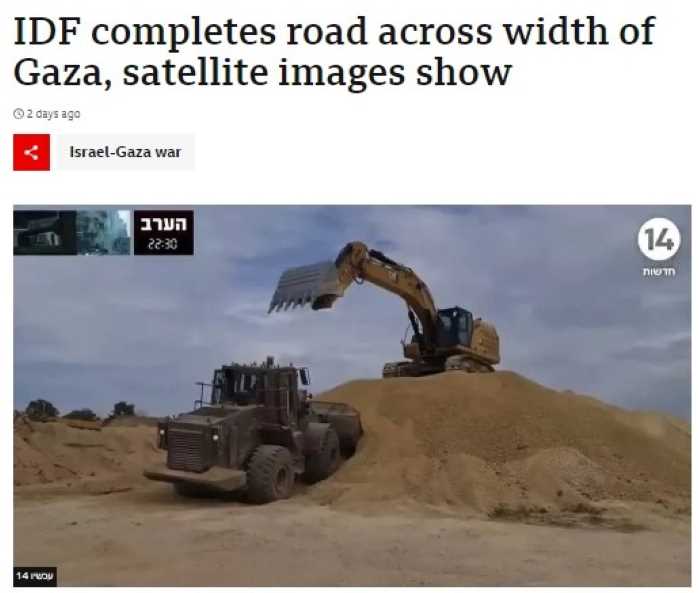
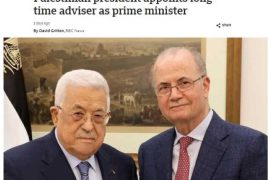
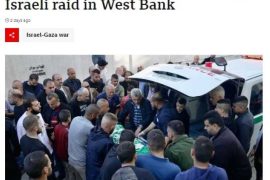
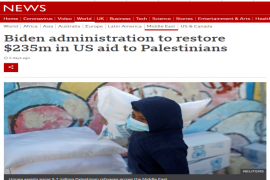

The BBC are only speculating and really just want to inflame already high tensions and cause further trouble, despite the assurances already given by the Israeli government. Well it is Ramadan and the BBC love to cause trouble at Ramadan like the rest of the Islamists. #defundthebbc